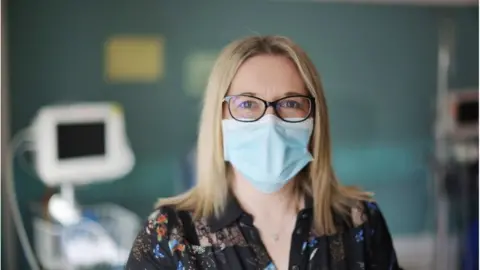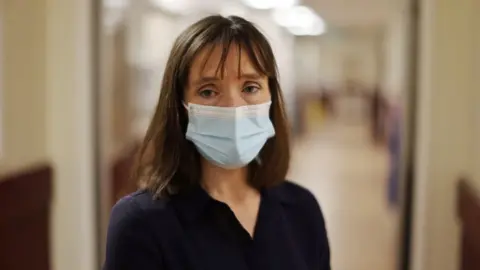Two years on Covid has changed but it's still huge
When Scotland went into lockdown on 23 March 2020, there were 83 confirmed cases of coronavirus. Compare that to the many thousands of cases we are recording today.
But coronavirus was spreading rapidly in the community and back then there were no vaccines, no known treatments.
The only way to control it and limit the death toll was to impose harsh restrictions that would have a profound impact on our daily lives.
In 2020, the NHS was put on an emergency footing, that meant suspending many of the day-to-day things hospitals do.
Routine screening was paused, instead of people getting their hips and knees done, wards were reorganised and staff redeployed to treat Covid patients.
Visiting Ninewells hospital in Dundee in those early days there was a clear sense of apprehension.
Families devastated
Staff living on adrenaline, rallying together against an unknown danger. PPE, protocols, the patient headcount were all changing by the hour.
Respiratory consultant Dr Tom Fardon, was one of those on the front line.
"We knew nothing about it two years ago," he said. "We saw a disease that we had very little understanding of that just tore through our vulnerable populations.
"At the start we extrapolated from flu or other viruses and we felt that younger people probably wouldn't be too badly affected and it would be a mild flu like illness.
"We learned very quickly that's just not the case for some people."

Dr Tom Fardon said that looking after the sickest patients during the first two waves had taken its toll.
"Those of us who worked in critical care saw families devastated by this disease, we looked after married couples who died in beds next to each other.
"We saw families where daughters, sons, mums and dads came into critical care together. So yes, it was very sobering, very challenging."
Dr Monica Doyle is NHS Tayside's clinical director for unscheduled medicine. She too has worked in intensive care and says at the time no-one believed the pandemic would last this long.
"We set up a Covid assessment unit in a separate area of the hospital so it was safe for patients," she said.
"Everybody was really willing and able but the problem is that it really is a marathon and not the sprint that we anticipated at the start, so people are quite tired now."
Life-changing treatments
This week has seen record numbers of Covid patients in hospital in Scotland, hospitals are under extreme pressure. But it is different now.
As of 22 March there were 2,221 Covid patients in hospital, with 29 in critical care. During the peak of the Alpha wave in January 2021 there were 2,053 Covid patients with 161 of those in critical care.
So what has changed? There is clear evidence that vaccines offer a high degree of protection against serious illness. Doctors also know so much more about how to treat the disease.
Medicines have been repurposed and new antibody and antiviral treatments have been developed. The outcome for patients with Covid has greatly improved.
But with high prevalence in the community, there will inevitably be higher numbers of Covid patients in hospital.

Dr Doyle says between one half and two thirds of patients in Ninewells are asymptomatic or testing positive after being admitted for a different medical condition.
"The treatments that we've got now compared to the first wave are life-changing and life-saving.
"It's not gone in terms of critical care, today for example we have three patients in intensive care and one in high dependency in our Covid section so we have to have a separate ward for that.
"But we need to start to live with that so we can remobilise so we can start seeing people in clinics again."
And that is the impact the pandemic is having now. Science and medicine have blunted the disease but Covid has left a sting in its tail.
Hospitals heavily restricted
Over half a million people in Scotland are on waiting lists, almost 10% of the entire population.
Record numbers are waiting longer than they should in emergency departments and people are struggling to get appointments with their GP.
These are problems that the NHS was facing before Covid but they have been exacerbated like never before.
Dr Pamela Johnston is NHS Tayside's operational director. She says here, like in other parts of Scotland, it will be some time before they can start to get those waiting lists down.
"The first thing is we have to get the community prevalence of coronavirus down to a point where the hospital doesn't have patients and our staff are back to work," she said.
"I understand that the community is moving at a faster pace than the hospitals are. The hospitals are still quite heavily restricted with what we can and cannot do around Covid.
"Until we can get past this bit of our journey with coronavirus, I would ask the public to be a little bit more patient with us until we can catch up with the community.
"At the end of the day no pandemic goes on forever. We know from history pandemics burn themselves out eventually and I'm sure this one will as well."


